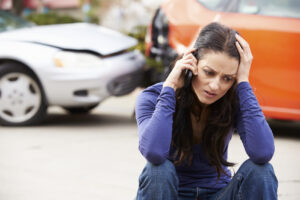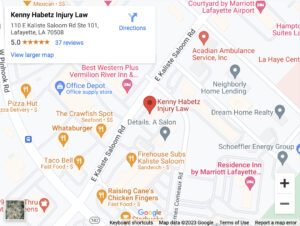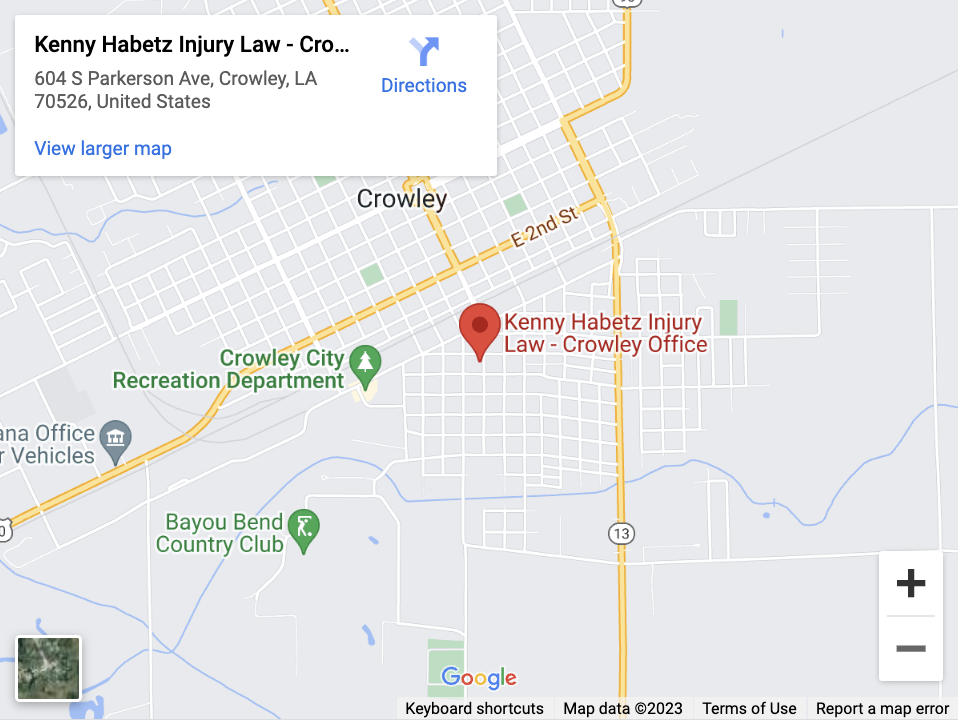
Car accidents happen for three main reasons. According to the National Highway Traffic Safety Administration (NHTSA), 94% of crashes result from driver errors, 2% from environmental factors, and another 2% from equipment failures.
To help prevent that last category of crashes, Louisiana has one of the country’s most rigorous car inspection laws. After an accident in Lafayette, LA, each party’s compliance with these laws could determine who caused the collision and who is liable for the resulting injuries.
The team at Kenny Habetz Injury Law can fight for fair compensation if another party is at fault. For help, contact our firm for a free case review at (337) 399-9000.
How Kenny Habetz Injury Law Can Help You After a Car Accident in Lafayette, LA

Since 2010, Kenny Habetz Injury Law has helped clients in Lafayette, Louisiana, fight insurers and at-fault parties for compensation. Over that time, the firm’s Lafayette car accident lawyer has successfully recovered millions of dollars for victims.
Our firm provides the following services if you get injured in an accident caused by another’s actions:
- Reviews your case and explains your legal rights
- Collects evidence, such as medical records and police reports, for your claim
- Prepares an insurance claim and works aggressively toward a settlement
- Fights for you in court if a settlement cannot be achieved
An auto accident can cause costly injuries and disabilities. Contact our Lafayette personal injury lawyer for a free consultation to discuss your crash and the compensation you can seek under Louisiana law.
How Common Are Equipment Failures?
Louisiana releases crash statistics through LSU’s Center for Analytics and Research in Transportation Safety (CARTS). According to the “Crashes by First Harmful Event 2023” table on the “How Crashes Occur” tab, Louisiana had a total of 38,889 collisions that resulted in injury or death that year.
Using the 2% estimate from the NHTSA, you would expect about 778 of those crashes to have resulted from equipment failures such as blown tires or brake malfunctions. However, the table shows that police only verified one crash caused by a vehicle fault.
There are two ways to interpret this disparity. Louisiana might argue that its rigorous vehicle safety inspection program works because it reduced the number of equipment-related crashes from 778 to one. You could also argue, though, that equipment failures only caused 0.003% of crashes, meaning the vehicle safety inspection program is wasteful.
Louisiana’s Car Inspection Laws
The state has an interest in keeping dangerous vehicles off the roads. Car inspections in Louisiana can happen in the following two ways:
Spot Inspection By the Police
Louisiana law allows the police to stop your vehicle for any of the following equipment-related reasons:
- It is in an unsafe condition, such as duct tape holding the bumper on
- Required pieces of equipment, like brake lights, are missing or broken
- It has prohibited equipment, such as illegal window tint on the windshield
An officer will inspect your vehicle after stopping you. They may issue a warning or a citation if the inspection reveals that your vehicle violates state safety laws.
In many cases, the police will allow you to move a non-compliant vehicle after a traffic stop so you can have it repaired. However, the police can also prohibit you from driving a vehicle in such poor condition that it endangers others. In these situations, officers might require you to leave the vehicle or have it towed.
Annual Motor Vehicle Inspection
All registered vehicles in Louisiana must pass an annual motor vehicle inspection (MVI). An inspection station licensed by the state checks the vehicle’s equipment. The inspection station is allowed to charge a fee that the state sets.
The standards for inspection are established in the Louisiana Administrative Code, Title 55, Part III, Chapter 800. The driver must present a driver’s license, vehicle registration, and proof of insurance. Also, the VIN on the registration must match the car, and the vehicle must have license plates. The station cannot inspect vehicles missing any of these elements.
During the inspection, a mechanic checks the following equipment and systems:
- Speedometer and odometer
- Brakes
- Parking brakes
- Lights, including tail lights, brake lights, backup lights, and headlights
- Turn signals
- Mirrors
- Windows, windshield, and windshield wipers
- Wheels and tires
- Steering system
- Seats and seat belts
- Exhaust system
Vehicles that fail the safety inspection cannot receive a registration or renewal. Inspection stations must provide a free reinspection within 30 days after failing an inspection to allow the owner to repair the vehicle.
Liability For Equipment-Related Crashes
Drivers may be liable for traffic crashes caused by equipment failures. For example, a driver who blames their brakes for a rear-end crash might not escape liability. If the driver knew or should have known there was a problem with the vehicle, the failure to fix it might constitute negligence.
Schedule a Free Consultation With Our Experienced Lafayette Car Accident Attorney
Another driver can crash into you even when you comply with the state’s car inspection requirements. Contact Kenny Habetz Injury Law for a free initial consultation to learn about your right to pursue compensation after another vehicle hits you.


